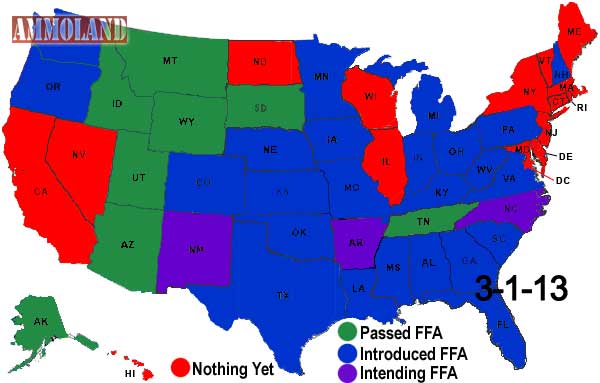By Gary Marbut, Montana Shooting Sports Association


Missoula, MT –-(Ammoland.com)- Nearly a decade of carefully planned effort to challenge federal Commerce Clause power will see another landmark on Monday, March 4th 2013, when MSSA v. Holder has oral argument before the U.S. Ninth Circuit Court of Appeals in Portland, Oregon.
MSSA in the case caption is the Montana Shooting Sports Association whose President, Gary Marbut, crafted the original Montana Firearms Freedom Act (MFFA) in 2004 specifically to lay the groundwork for this current litigation.
Although the MFFA was introduced in the Montana Legislature in 2005 and 2007, it didn’t take off until 2009 when the Montana Legislature passed it and Montana’s Governor Brian Schweitzer signed it into law. Soon thereafter, MFFA clones were enacted in seven other states and MFFA-clone bills were introduced in 20-something other states. See: www.FirearmsFreedomAct.com
In its Commerce Clause challenge, the MFFA declares that any firearms made and retained in Montana are simply not subject to any federal regulatory authority the states gave to Congress to “regulate commerce … among the several states …” in the Constitution.
On the day the MFFA became effective in Montana, the MSSA filed its planned lawsuit to validate the principles of the MFFA in federal court. Marbut is an individual plaintiff in this lawsuit, and the Second Amendment Foundation is an organizational plaintiff along with MSSA. MSSA v. Holder quickly gained support from many interested parties, including the Attorneys General of nine states, the Center for Constitutional Jurisprudence, the Goldwater Institute, Gun Owners Foundation, Montana legislators, more recently CATO, the Pacific Legal foundation, and others.
MSSA v. Holder was dismissed by the federal district court over standing issues, which dismissal is on appeal to the Ninth Circuit. Plaintiffs do not believe a favorable ruling from the Ninth Circuit is likely, which would actually position plaintiffs better for an appeal to the US Supreme Court. Ultimately, only the Supreme Court can grant the remedy plaintiffs seek, to reverse over a half century of unfavorable Commerce Clause precedent that has shifted massive amounts of effective power from people and states to the federal government.
Normally, the Supreme Court is reluctant to reverse precedent, under the doctrine of stare decisis. However, Chief Justice Roberts recently addressed the subject of stare decisis in the Citizens United v. Federal Elections Commission decision where he instructed that precedent should be ignored or revised, “… when the precedent’s underlying reasoning has become so discredited that the Court cannot keep the precedent alive without jury-rigging new and different justifications to shore up the original mistake.”
Hardly any better description may be made of the Court’s history of Commerce Clause precedent.
Once MSSA v. Holder gets to the Supreme Court, plaintiffs will have the opportunity to advance significant new arguments that have never effectively been made about federal Commerce Clause power, one of the “enumerated powers” in Article I of the U.S. Constitution. Court-allowed expansion of federal Commerce Clause power has arguably ushered in the greatest expansion of federal power over states and people since the Civil War.
As a part of the process, MSSA v. Holder plaintiffs are determined to breathe significant life back into the much ignored Ninth and Tenth Amendments to the U.S. Constitution, arguing that the Ninth and Tenth are not irrelevant surplus, but actually amended the underlying Constitution, including proper interpretation of the Commerce Clause. In the Supreme Court’s D.C. v. Heller decision, Justice Scalia closed with, “… it is not the role of this Court to pronounce the Second Amendment extinct.” Ditto the Ninth and Tenth Amendments.
Will these fresh arguments about the Commerce Clause prevail? That remains to be seen. However, the nation seems to be in the mood to challenge federal power on many fronts. The Supreme Court is certainly aware of these winds of change blowing across America.
Gary Marbut, presidentMontana Shooting Sports Associationwww.mtssa.orgauthor, Gun Laws of Montanawww.mtpublish.comGary Marbut is a successful citizen advocate, the creator of political efforts such as the Firearms Freedom Act movement, is President of the Montana Shooting Sports Association, is a student of the Constitution, and accepted in state and federal courts as an expert in self-defense, use of force and firearms safety.
About Montana Shooting Sports Association:MSSA is the primary political advocate for Montana gun owners. Visit: www.mtssa.org

“Where rights secured by the Constitution are involved, there can be no rulemaking or legislation which would abrogate them. “ Miranda v. Arizona – 384 U.S. 436 (1966) at Page 384 U. S. 491.
Stand & Fight………..Use them or lose them NRA ………Molon Labe
In order to win a case, someone will have to be ‘damaged’. You must ‘set-up’ a case. Example: T. Marshal and Rosa Parks. Got it. You are going to have to be arrested, go to jail.
אלהים Elohim is great!
An individual MUST be damage, have his Constitution Rights impaired before the Court wil accept his cause of action. Rule 12 (b).
Everybody already knows that holder is of such low character that he will do the same as when the Fast and Furious played out. Remember they believe they are above the law.
That’s all well and good, but the states should be challenging the use of the Commerce Clause to prohibit/restrict/inhibit interstate commerce in firearms, instead of promoting and facilitating it as Congress is supposed to be doing with all interstate commerce. I understand that Wickard v. Filburn permits Congress to prohibit some types of production and distribution activity under the Commerce Clause, but I believe there’s an exception when it comes to firearms. Why? Because the Second Amendment antedates the Commerce Clause. So while the Commerce Clause may have allowed Congress to prohibit the production and distribution of firearms, because the… Read more »
Holder and his boss are national embarrassments
The SC better nip this popular uprising in the bud and show us peons who rules this country, else they could have some problems on their hands.